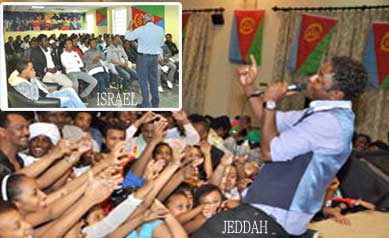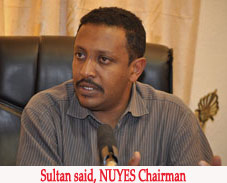Eritrean Embassy In Saudi Arabia: Nightclubs Unincorporated

It is a well-known fact that the Eritrean ruling party monopolizes the entire Eritrean economy, including the smuggling business. Hundreds of containers arrive at Massawa and they are declared transit goods destined for the Sudan. But somehow, the goods find their way to Eritrean retail outlets, mainly distributed from Tessenei, through the wholesale trade which is primarily controlled by affiliated operators of the ruling party.
The regime killed private enterprise and suffocated business people only to replace them with its own front-men in everything they did, except entrepreneurship. And this is a long established behavior of the regime.
In the nineties of the last century, it was common to witness passengers heading to Asmara via Addis Ababa arriving at Bole Airport with over a dozen large cartons and bags. Eritrean Embassy personnel would be waiting for the “mules” at the airport accompanied by individuals who apparently were there to usher the goods out. Then you observe a number of coolies pushing a caravan of trolley past the customs line, unquestioned. Once the trolleys reach the parking lot, the cartons and bags are loaded into a waiting truck. The following day, maybe the electronic and perfume market, would be awash with Korean or Japanese goods that arrived via Saudi Arabia and Dubai.
In Addis Ababa, if visitors wished to exchange their dollar bills for Ethiopian Birr, they approached one of several innocent-looking exchange agents who masquerade as booksellers or cigarette vendors sitting in a tiny kiosk. They ask, “How much currency do you have?’ Then they immediately call the Eritrean embassy and utter a few unintelligible code words, “snt ale…” [How much is it?] Then they drop the phone and in sotto-voce spell the buying price.
A few Eritreans living in Ethiopia considered the nineties an open season to loot; they lent their name to the PFDJ in a fake ownership declaration of business establishments and become a facade for investing the ruling party’s funds. After the honeymoon that extended for a few years ended, it blew on their faces; the storm didn’t settle before it swept numerous innocent, hardworking Eritreans in its wake. And that behavior of the ruling regime is a major contributor to the situation that led to the Badme war; Eritreans suffered gravely and the repercussions of that adventure are still sucking their blood.
Many diaspora Eritreans don’t seem to notice that behavior is being replayed in the West. A few are too young and too fresh to remember, they left Eritrea only recently. While others are stakeholders in the racket and beneficiaries of the proceeds of the PFDJ’s illegal and clandestine enterprises. For example, independent diaspora Eritreans cannot compete against the PFDJ in the nightclub and entertainment business!
In Saudi Arabia, where men and women are segregated, and where liquor and gambling is supposedly banned, the Eritrean embassy provides an alternative, with impunity. It is the only entity in that country that offers parties and gambling services in its premises: Bingo and card games. A casual visit to the embassy managed compounds in Riyadh and Jeddah explains what goes in there. The moment a zealot person discovers that, it will be ‘1998 Ethiopia’ all over again. However, so far,the diplomatic immunity the embassy enjoys has been an excellent excuse.
While the young, overwhelmingly single, flock to the embassy to party and listen to the “Objective Situation In Our Country“, the elderly frequent the embassy grounds to spend their evenings playing bingo and card games—and in the process they contribute to inflating the PFDJ pockets.
About ten years ago, a diplomat left Jeddah in a rush when the Saudi’s apprehended one of his distributors with Jhonnie Walker bottles in his car boot. When the security officers searched his residence, it yielded crates of liquor bottles, and tens of thousands of Saudi and US currency.
In the West, where party-goers have convinced themselves dancing all night is an act of rebuilding Eritrea, the provider is the Eritrean ruling party through its front men. The hall of every party they organize would be mistaken for a national day parade with flags covering the color of the walls and the ceiling. Some party-goers act as if they are heading to a battle ground to defend Eritreans from “an invasion” by partying in cities tens of miles away. Others wrap themselves in flags and engage in binge, drinking to demonstrate their love of their country and government—the people come distant third, if they are ever remembered. In the wee hours of the morning, intoxicated party-goers disperse walking in zigzag, elated they did their share in defending their country.
Each party is preceded by a ruling party official opening the event (festivals are improvised on the go) and delivers a speech regarding the “Objective situation in our country.”
A day or two later, the media outlets of the Eritrean regime would carry headlines:
“Eritrean community members in Israel express readiness to enhance role in State affairs.”
Or,
“Festival of Eritrean community members in Jeddah concludes.”
Or,
“Eritrean community members in Switzerland assert readiness to step up participation in development endeavors.”
The titles on the regime media reports consistently read, “The [put a name of a festival that crosses your mind here] was celebrated by Eritreans in [put a name of a city here] with Zeal.”
This time in Saudi Arabia, Fozia Hashim, the lady babysitting the orphaned Ministry of Justice for the ruling regime, “stressed the need for active participation of citizens towards the realization of national development goals with a view to building a nation in which social justice prevails.”
Every official echoes that mouthful sentence, occasionally a little longer. And clips of such events is what the regime broadcasts in television, radio and print for the consumption of its captive audience in Eritrea.
How about those in Israel?
The ruling regime’s website reported that, “Eritrean community members in the Israeli cities … expressed readiness to enhance role in State affairs through enhanced organizational capacity.”
Feel free to contact the PFDJ for an explanation of that since not many understand what it means. However, Tesfamariam Tekeste, the ruling party’s ambassador to Israel, seems to be the “enhancer.”
To have an insight, our reporter talked to several of those who recently escaped from slave labor and oppression in Eritrea, went through the horrors of Sinai and paid ransom to reach Israel, but never missed a chance to attend a PFDJ function!
Very few Eritreans left their country before the seventies. Until then, they either suffered silently in their country, or, were pushed to exile in Sudan as refugees, or, carried guns and fought the Ethiopian occupation. Eritrean diaspora is a relatively new phenomenon. That is why in the mid seventies, people who left for the Arab Gulf, mainly Saudi Arabia, made sure to return to Sudan the minute they saved enough for the trip. Every Eritrean remembers how those who left a short time earlier returned looking as fresh as a bride with makeup, gold chains adorning their neck, and carrying a handbag known as “Kezaba” where they stash their papers, passport and money. They impressed those they left behind by telling them how much they were earning in Saudi Arabia and what type of cars they own.
If you thought human needs to boast is dead, realize you are wrong. If you thought that need could not be contemplated in this era, you are wrong.
The first few years after one leaves his country are extremely nostalgic. Assimilation is veritably difficult and if one could break that nostalgic agony by returning home for a month, to show off and ameliorate the nostalgia, that is what anyone would do.
Frequenting the regime sponsored parties puts your name in the safe list of the regime and provides the security you need when you visit home. The ruling party has devised a system to exploit this human need: it offers “Regret Papers” for those who escaped Eritrea to fill up and sign. Subsequently, they pay the fees, pay for a passport and transfer their money through the PFDJ system. Once they arrive in Eritrea they assign half of their time to visit their family, friends and roam the streets of their childhood. The other half of the time is allocated to showing off and entertaining themselves and their friends. How much does a bottle of beer cost? Seven Nakfa. How much is that in Dollars? Twenty-five cents. What? Okay, fetch us 50 bottles!
See! Nothing comforts the ego than being able to spend in front of your peers, particularly for a nostalgic person. And that is the reason why a considerable chunk of the newly arrived escapees from Eritrea are party-goers. Those who fill out asylum application papers with heart-wrenching narrative of their ordeal, return to PFDJ ruled Eritrea to visit in a year or so. But this time, they are cash cows for the regime and they do not bother them or round them up with the local youth who cannot be milked of anything but their sweat—and their sweat and blood production has already been confiscated by the ruling party since a long time!
For a young Eritrean stuck in the “national service” projects for countless years and prefers to stay in his country, unfortunately the only way out for him is to cross the border, reach to place where they pay in hard-currency, submit a “Regret Paper” at the nearest Eritrean embassy, and in about a year, return home a relatively free person. And that is the push and pull factors forcing the youth to leave their country. And that explains why a considerable chunk of the newly arrived are regular customers of the parties organized by the PFDJ Nightclubs Unincorporated.


Awate Forum